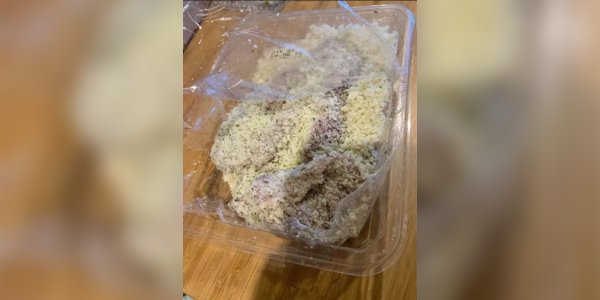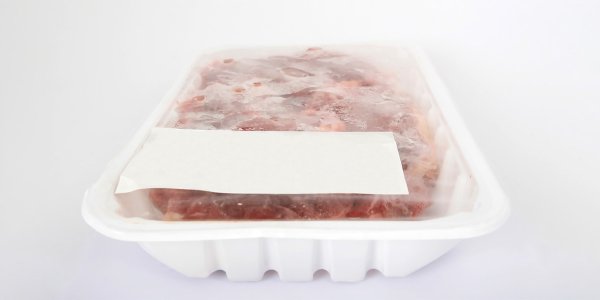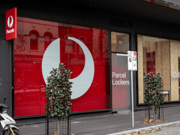Detail on ALDI meat product leaves shopper stunned: ‘I think it’s a weird move…’
- Replies 6
These days, excessive use of anything makes for quite a shameful, if not disappointing, story.
On that note, ALDI, acclaimed for its efforts towards sustainable packaging, surprised one customer who discovered a meat product enveloped in plastic—lots of it.
The shopper had purchased some crumbed pork schnitzels from an ALDI store in Sydney.
According to the customer, the pork schnitzels were packed in a plastic tray and then wrapped in another layer of plastic.
‘The amount of plastic packaging felt excessive and didn't appear to serve any additional purpose in protecting the food. The plastic container seemed more than enough to me,’ the customer told Yahoo News.
‘I think it's a weird move… one layer of plastic protection is surely enough?’

To stress the point, the customer said they were a regular at ALDI stores and had never encountered this strange double-wrapped anomaly before.
‘From my point-of-view, it does seem to contradict their efforts to be more sustainable,’ he said, unafraid of calling the budg et retailer out.
‘I don't know much about best packaging practices, but two layers of plastic doesn't sound right.’
The budget supermarket had begun packing mince meat in bags that use 70% less plastic than conventional trays. This was part of their ambitious commitment to reduce plastic packaging by 25% by the end of 2025. You can read more about that here.
In response to the bewildered shopper's remarks, an ALDI spokesperson clarified the situation, labelling the extra wrapping around the pork schnitzels as an 'isolated incident'.
‘The layer of plastic that enables short-life products to be vacuum sealed seems to have separated from the container while being processed, appearing as an additional layer of packaging despite this not being the case,’ they explained.
‘There is no food safety issue or risk to the product being consumed.’

The ALDI representative also promised a thorough investigation into this apparent slip from their high-quality standards. They emphasised that unsatisfied customers could return the product for a full refund.
Whilst on the topic, Environmental Scientist Dr Paul Harvey urged supermarkets to double down on the fight against plastic waste.
‘For so long Australian consumers have been misled into thinking that recycling soft plastics through schemes like REDcycle is a way out of the plastic pollution problem—it isn't,’ warned Dr Harvey.
Earlier this year, REDcycle, a company formerly working with large businesses like Coles and Woolworths with recycling, was declared insolvent. The development raised questions on the sustainability of similar efforts and the stark lack of viable alternatives when it came to responsibly dealing with plastic waste.
'The only way out is by reducing the plastic used across multiple industry sectors,' Dr Harvey added.
By way of a subtle warning, he also urged national supermarkets to do better.
‘Supermarket retailers need to step up and take responsibility for their sector's contribution to the waste problem. If the supermarkets won't do it willingly, then it is time for regulators to step in and mandate changes.’

So, folks, if your next purchase leaves you pondering over peculiar plastic packaging, make sure to voice your concerns. After all, every little helps protect against plastic pollution.
Have you seen or encountered anything similar while out on your grocery runs, members? Share your experience below!
On that note, ALDI, acclaimed for its efforts towards sustainable packaging, surprised one customer who discovered a meat product enveloped in plastic—lots of it.
The shopper had purchased some crumbed pork schnitzels from an ALDI store in Sydney.
According to the customer, the pork schnitzels were packed in a plastic tray and then wrapped in another layer of plastic.
‘The amount of plastic packaging felt excessive and didn't appear to serve any additional purpose in protecting the food. The plastic container seemed more than enough to me,’ the customer told Yahoo News.
‘I think it's a weird move… one layer of plastic protection is surely enough?’

The ready-to-cook schnitzel was allegedly wrapped twice in plastic, drawing the shopper’s attention. Image Credit: Supplied
To stress the point, the customer said they were a regular at ALDI stores and had never encountered this strange double-wrapped anomaly before.
‘From my point-of-view, it does seem to contradict their efforts to be more sustainable,’ he said, unafraid of calling the budg et retailer out.
‘I don't know much about best packaging practices, but two layers of plastic doesn't sound right.’
The budget supermarket had begun packing mince meat in bags that use 70% less plastic than conventional trays. This was part of their ambitious commitment to reduce plastic packaging by 25% by the end of 2025. You can read more about that here.
In response to the bewildered shopper's remarks, an ALDI spokesperson clarified the situation, labelling the extra wrapping around the pork schnitzels as an 'isolated incident'.
‘The layer of plastic that enables short-life products to be vacuum sealed seems to have separated from the container while being processed, appearing as an additional layer of packaging despite this not being the case,’ they explained.
‘There is no food safety issue or risk to the product being consumed.’

Various states have enforced bans on single-use plastics in Australia to varying degrees. Image Credit: Pixabay
The ALDI representative also promised a thorough investigation into this apparent slip from their high-quality standards. They emphasised that unsatisfied customers could return the product for a full refund.
Whilst on the topic, Environmental Scientist Dr Paul Harvey urged supermarkets to double down on the fight against plastic waste.
‘For so long Australian consumers have been misled into thinking that recycling soft plastics through schemes like REDcycle is a way out of the plastic pollution problem—it isn't,’ warned Dr Harvey.
Earlier this year, REDcycle, a company formerly working with large businesses like Coles and Woolworths with recycling, was declared insolvent. The development raised questions on the sustainability of similar efforts and the stark lack of viable alternatives when it came to responsibly dealing with plastic waste.
'The only way out is by reducing the plastic used across multiple industry sectors,' Dr Harvey added.
By way of a subtle warning, he also urged national supermarkets to do better.
‘Supermarket retailers need to step up and take responsibility for their sector's contribution to the waste problem. If the supermarkets won't do it willingly, then it is time for regulators to step in and mandate changes.’
Key Takeaways
- An ALDI customer in Sydney was concerned over the excessive plastic packaging he found with a pork schnitzel product.
- The customer felt the extra layer of plastic did not serve an additional purpose, and this conflicted with ALDI's recent sustainability efforts.
- An ALDI spokesperson commented that the extra layer of plastic was an 'isolated incident’ and not indicative of the product's overall packaging.
- Environmental Scientist Dr Paul Harvey advised that supermarkets need to contribute more significantly to reducing plastic waste.
So, folks, if your next purchase leaves you pondering over peculiar plastic packaging, make sure to voice your concerns. After all, every little helps protect against plastic pollution.
Have you seen or encountered anything similar while out on your grocery runs, members? Share your experience below!







